
Clive Bull 1am - 4am
16 October 2020, 10:48 | Updated: 3 December 2020, 15:59

LBC exclusive investigation into forged 'cladding-safety' forms
An LBC investigation has evidence that a company in South-Wales has provided a number of forged 'cladding-safety' forms to unsuspecting customers, for thousands of pounds.
External Wall Fire review forms (known as EWS1 forms) were introduced last year following the Grenfell fire, to prove to nervous lenders that any cladding on residential buildings is safe.
Without one, flat-owners cannot sell, as their homes are valued at ‘zero.’
But, with high demand, and only a small number of qualified chartered surveyors and engineers able to do the work, experts warn the system has become a 'magnet for fraud.'
Flat owners told their homes could be unsellable for 10 years over unsafe cladding
Across the country, this is leaving thousands of flat-owners at risk of being scammed into paying for safety-documents that are either fakes, incorrect, or just invalid due to individuals not having the correct qualifications.
'Specialist Façade Inspections ltd,' was set up at the end of last year by a 22-year-old business studies graduate called Joshua Tedstone.
SFI ltd have inspected more than 200 buildings, offering “full Cladding Fire Testing and Inspection services […] and provide an extensive External Wall Fire Review (EWS1) for your property.”
They appear to be charging anything from £1,200 to £110,000 for the work.
Cladding Scandal: Labour MP challenges Government over EWS1 form
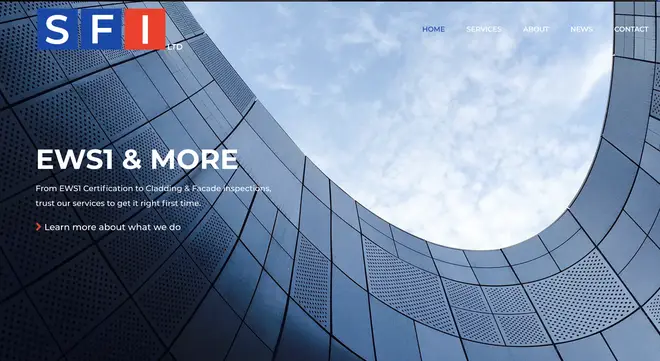
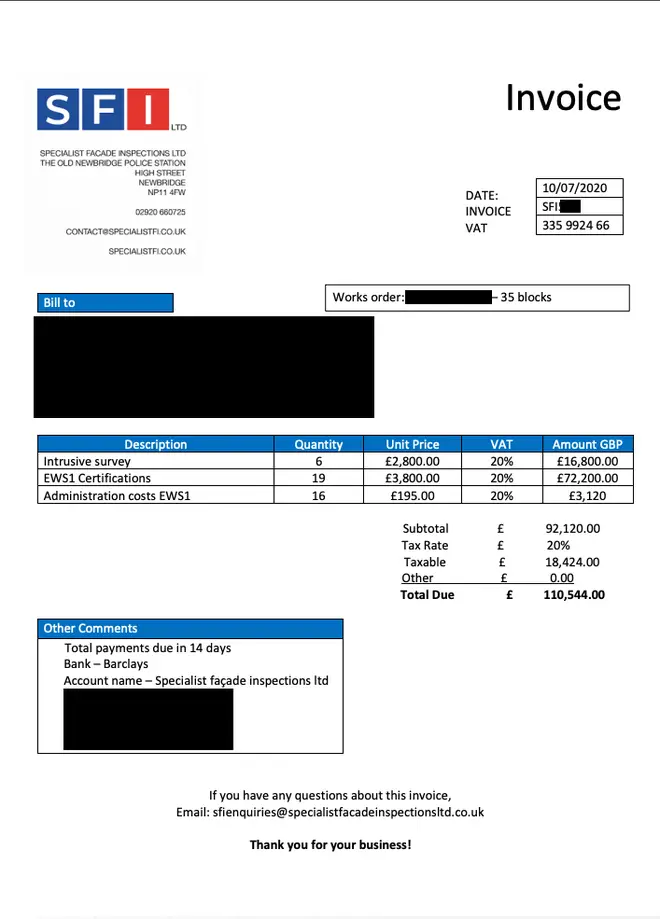
But over the summer, leaseholders in buildings which had been inspected by SFI realised that a key signature on their forms had been 'forged.'
The signature on their documents was allegedly from a Manchester-based Chartered Surveyor, who we're calling "Jane Doe" to protect her anonymity.
But she has put this warning on her LinkedIn:
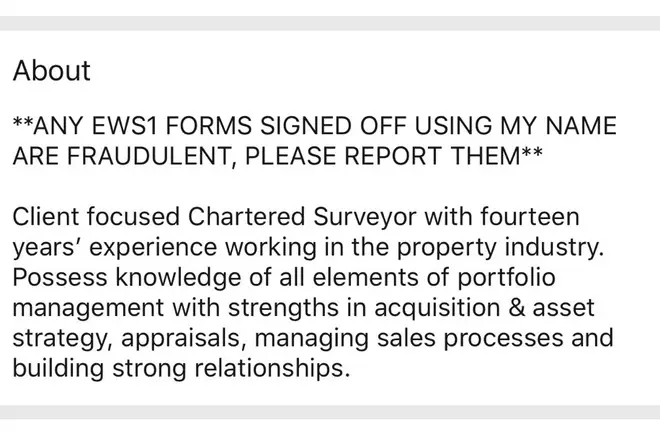
Emily lives in one of the many buildings where SFI arranged an inspection and supplied a report:
"We dug out our reports and we looked up the signature and sure enough we found her LinkedIn profile that stated that any forms signed by them was fraudulent. We were shocked! We're going through enough as leaseholders, and to know there are people out there possibly taking advantage of us and getting more money out of us is quite shocking."
I have since spoken to Jane, who insists she had never heard of SFI before seeing these forms and that the signatures used (there are two versions, with markedly different handwriting) are not her own.
She also told me she has no real expertise in fire safety and that she “wouldn’t know a piece of cladding if it hit me in the face.”
Jane has since reported the matter to the police, but is concerned that two months on, no one has come to take a statement from her.
In an earlier statement to journalists this year. SFI said that no one in the company at the time had the relevant qualifications to verify the work and sign the forms, but paid a 'third party' £200 a form to verify and sign their surveys.
In one email to a client, dated 26th August 2020, the company’s Chief Technical Officer Paul Tedstone, Josh Tedstone’s Father, wrote:
"I never knew, or heard of "Jane Doe" until [redacted] sent her CV and we continued to pay for her services until we found out that she, at a point in time, stopped without our knowledge."
That contrasts somewhat with the claims at the start of all of their surveys, stating: "The inspection was conducted by and the report prepared under the direction of [Jane Doe.]"
Cladding Crisis latest: The 'Firetrap' Homes That Can't Get Fire Insurance
The company has since recalled all of her certificates, and quickly reissued them with new signatures on.
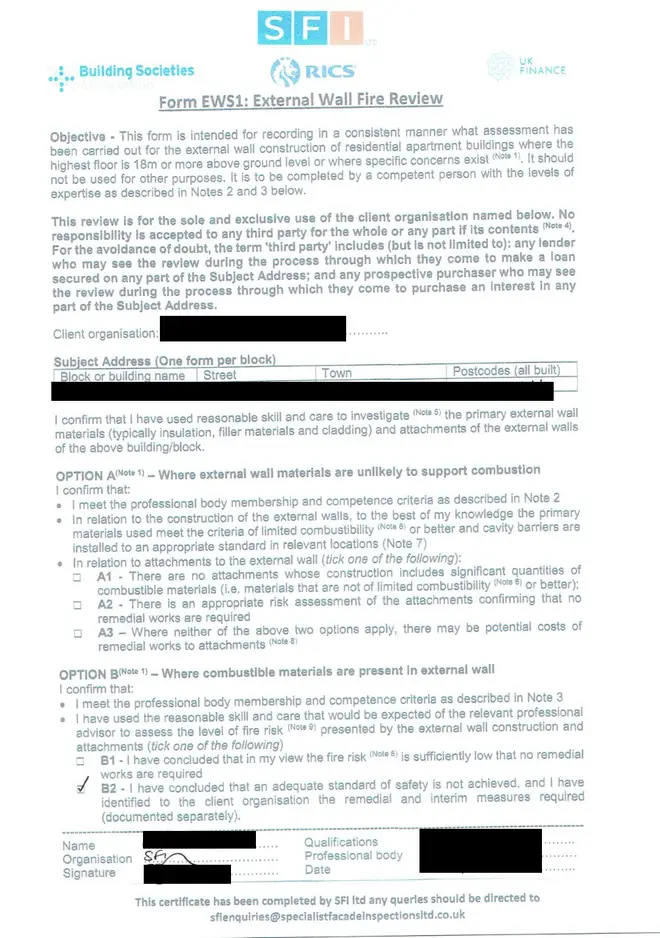
But LBC can reveal that on the reissued forms we have seen, those surveyors also aren’t suitably qualified to do the work.
This could make those reissued forms invalid as well, as EWS1 certificates can only be provided by qualified chartered members of relevant professional bodies, such as RICs or the IFE.
One of the two men is a non-chartered 'applicant member,' of the Chartered Institute of Building, which means he's at least a degree-level graduate who paid to join up, but hasn't been reviewed for a chartered status.
The other, is a chartered member of the Institution of Occupational Safety and Health, which isn’t an authorised body, and claims to be an Associate of the Institute of Fire Engineers.
A Which? investigation revealed some leaseholders are being duped into paying thousands of pounds to fraudsters faking inspection forms amid concerns over fire safety.
Cladding Crisis: Two-thirds of buildings with Grenfell-style cladding 'have not had it replaced'
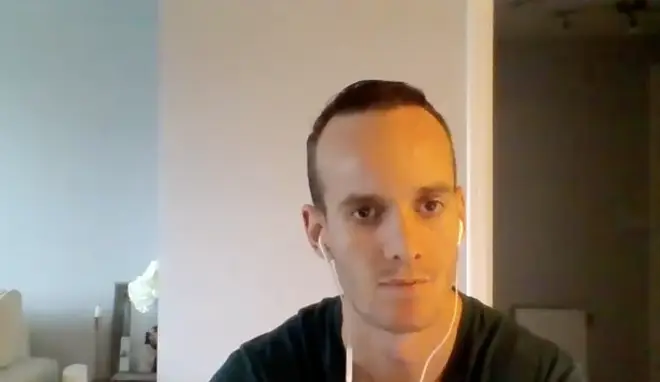
Anthony lives in another one of SFI’s surveyed buildings in London, he said this man signed his building’s second certificate:
"It takes me what 20 minutes to look him up on the internet and the letters after his name, and see that none of the letters qualify him to do this. It's bleedingly obvious. Form number two - also fake."
Residents in another building in Surrey went further, hiring a solicitor, who wrote to SFI about the man’s credentials, saying "that does not qualify him to provide a EWS1 certificate, regardless of him not having inspected the property."
The letter goes on: “In short, it is clear that the purported inspections never took place, the EWS1 certificates provided are either fraudulent or not signed by a suitably qualified person (or both) and the “report” provided is a work of fiction.”
SFI responded, calling themselves a “casualty of a third party breakdown in communication” and later paid the all money (£14,040) for that job back “as a gesture of good will.”
I provided a number of their surveys and certificates to an independent Chartered Fire Engineer, Jason Hill, who is also a Fellow of The Institution of Fire Engineers (IFE), and IFE Special Interest Group Chair for Industrial Fire & Risk.
His review presented a number of concerns ranging from missing information one would expect from such a survey to the way materials were assessed and he questioned how two buildings appear to have been assessed comprehensively on the same day some 40 miles apart.
He says "it takes time to assess a building, especially where there are several wall systems employed, this can take between a number of weeks and several months depending on the complexity of the property being investigated and the data made available from architect design to as built information and from the fire strategy to the fire risk assessment for the building."
I asked him "From what you've seen in these forms ... are you confident that they came to the right conclusions?
I’d say check again… "The most important aspect of conducting an investigation using scientific principles in the methodology or any other method is to avoid forming an opinion at an early stage. Doing so is likely to create a bias which may prejudice the outcome, known as expectation bias. The work produced is to carefully review all available evidence and data provided by the stakeholders to determine whether the building(s) investigated are a true representation of the build quality throughout the development"
"So they could be wrong, these could be fails when they're a pass, or they could be passes when actually they're a fail?"
"Yes I agree.”
We have also seen evidence that shows two buildings which were ‘failed’ by the Tedstones were later passed when a fresh survey was done, by a second, different, suitably qualified surveyor.
We put the concerns to the Royal Institute of Chartered Surveyors, who said: “We are currently reviewing concerns raised and any outcome of our investigation will be published our website.”
Finally, concerns have also been raised about a potential conflict of interest in the work done by the Director's Father Paul Tedstone.
Paul owns a cladding company, Uniclad Ltd, formerly PT Consultancy and the two work closely together.
Emily says Paul told her that her building had failed, but that he could do the work to fix it.
"He said that he could do the survey but that he could also do any remedial work that was required, that raised some alarms in our heads because we thought is there not a conflict of interest here?"
She said the whole system makes her feel "cross" "and “it doesn't seem right at all, because people could benefit financially from signing off buildings as unsafe, and they get the work. The whole process just needs to be looked at and made secure."
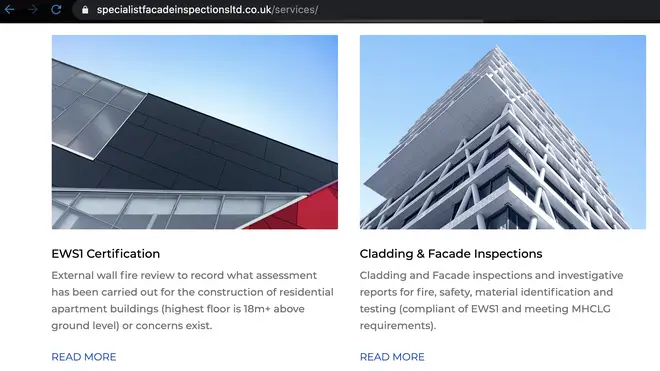
SFIL has rejected any suggestion that it uses inexperienced operatives to undertake any aspect of its role.
They have told LBC “All third parties that signed the EWS1 forms were suitably qualified to the best of SFIL’s knowledge and belief at all material times.”
SFIL has also claimed that they do not produce or sign EWS1 forms. Instead providing "diagnostic information to suitably qualified third parties that do prepare and sign [the] forms."
They add: “We are not aware of any buildings that failed which subsequently received a pass.”
And state “SFIL has not forged [Jane Doe’s] signature and there can be no evidence that SFIL did so.”
If you have been affected by the story, you can contact Action Fraud HERE.
Equally, please send us an email with your experiences HERE.